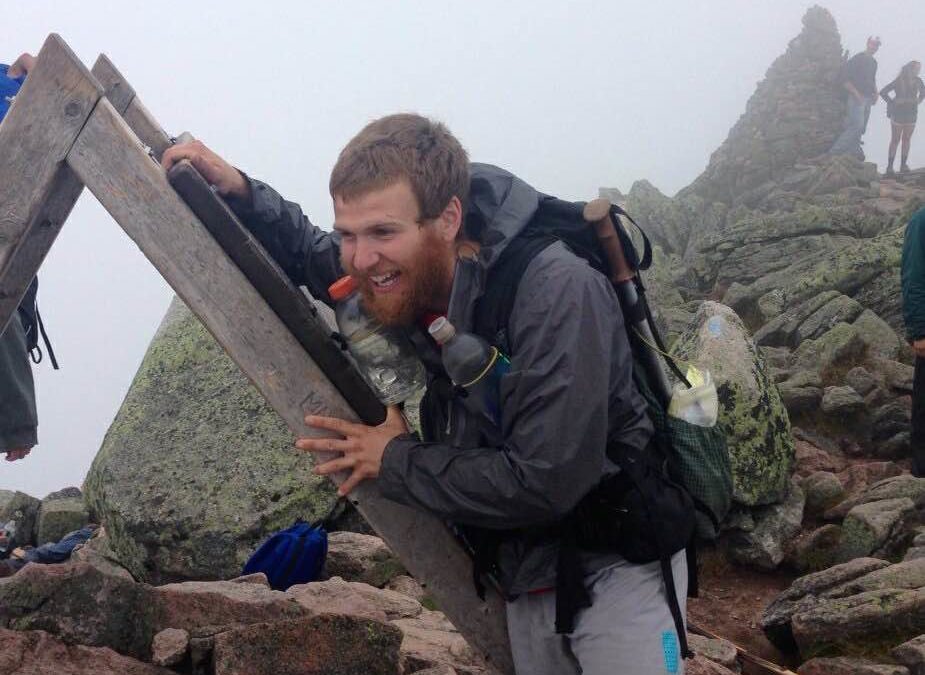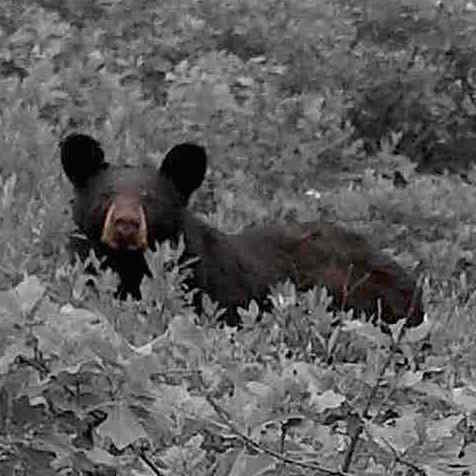Just the other day I sat down across from my pal Darren to grab a quick lunch when somehow or another, the Appalachian Trail came up. It had been two years since my thru-hike, and when I told Darren I had finished all 2,185 miles of the trail in one summer, we stayed immersed in the topic for a solid half hour.
Darren asked the usual questions, and I was happy to answer them all. What did I eat? Where did I sleep? How did I survive amongst the ax murderers and the wild animals in the Appalachian mountains? I’ve always enjoyed sharing stories about my dangerous encounters on the Appalachian Trail, but suddenly our conversation took a different turn, and we began to discuss the purpose behind thru-hiking the trail in the first place.
I thought hard for a moment while Darren waited in silence for me to explain. At first, it was hard to describe exactly what my reasons were for doing it. But slowly, as I began to share, I realized that I’d learned much more from that journey than how to be an outdoorsman or survivalist. I’d learned some valuable lessons on how to thru-hike the trail we call life.
Lesson #1: I Learned to be a Minimalist
“The process of living seems to consist in coming to realize truths so ancient and simple that, if stated, they sound like barren platitudes.” –C.S. Lewis
While thru-hiking the Appalachian Trail, I had to live with only the things I could carry on my back for quite some time, and what I would eventually come to understand is that having less in actuality is having more. It seems a bit ironic at first, but if you think about it, having less in a material sense can lead to having more in a mental and spiritual sense. You may be surprised to find that, when you simplify your busy life and forgo numerous possessions to be out in nature for any extended period of time, you feel a deep sense of calm and, in a word, contentment.
But how is it, you ask, that such great physical and external discomforts could amount to an internal peace for the mind and soul? To answer this question properly, we need come to a certain realization that the possessions in our lives define who we are on a far deeper level than we are probably aware. Our attitudes towards sharing and being hospitable are directly connected to the way we feel about our possessions. And as a result, in the process of removing the possessions which have no practical use for us nor bring purpose, meaning, or fulfillment into our lives, we can learn valuable truths about ourselves and the lives we live. Often enough, our possessions not only leave us feeling empty and wanting more in the end, but they actually serve to distract us from the things that really bring us joy and contentment in life. As we learn to let go of our excess belongings we become more selfless, which ultimately brings us more happiness than any material thing.
Tony Robbins once said, “if you want to be happier, expect less and appreciate more in life.” What I found is that owning less leads to desiring less, and desiring
I identify with Joshua Becker, who, in his blog “becoming minimalist” wrote these words:
“Over time, I have been able to remove myself from the incessant desire for more–even in a society that idolizes consumerism at every turn. And when our life’s desire shifts away from pursuing physical possessions, we are finally free to pursue lasting worth with all our heart.”
Lesson #2: I Learned a Greater Respect for Nature
Close to sunset, I was hiking up a steep mountain towards the end of the day and I could hear thunder in the distance. I had heard it all day long but I began to grow a little anxious when I saw the clouds quickly darkening and a thick fog moving in. It had already rained pretty hard a couple of times that day, so I figured the storm that was supposed to come through had already passed. As I continued to climb up, I started to have this feeling that it was going to get bad, almost instinctively I guess, kind of like an animal when it gets nervous right before a storm. I made up my mind to set up camp first chance I got so that I could shelter myself from the coming nightmare.
But I just kept walking, and walking, and could not find a flat piece of ground. “The first flat ground I come to,” I thought, “I’ll set up my tent before the storm hits and stay dry.” Lightning struck close by. Rain began to trickle, and I started to run. It was dark now so that I could hardly see a thing with the rain coming down harder by the second. At last, I came upon an old gravel road etched into the side of the mountain, where the grass had started to grow up again between the tiny stones, and I knew it wouldn’t be ideal or comfortable but I had to set up my tent there. But before I could pitch my tent or put on my rain gear, it really cut loose.
It was terrifying. Lightning struck almost directly over top of me. It was at least 3 times worse than any of the previous storms I’d been in, and that I knew for sure. I struggled to get my tent stakes through the ground, the stones being packed together so tightly, that I ran down the gravel road a short way and found a heavy rock I could use to beat the stakes into the ground. It rained so hard I could barely set my tent up as the water collected in a large pool on the tarp, which quickly weighed it down and made it collapse in a matter of seconds. I dumped the water out and jumped inside the tent with my backpack on because I was thinking I had to save my phone and other things from getting soaked. I desperately tried to prop up the tent with my trekking poles, and in my haste, I ripped a hole straight through the top on the side nearest me, so that I gave up on it and just used one pole instead. Now the tent was only half set up, and sitting inside it between one pole and two stakes in the ground, in a little space that was just enough room for me and my backpack to stay out of the rain, a lightning bolt must have struck again only 20 or 30 yards away. All I could see was a great white flash, even when I closed my eyes, and then I heard thunder so loud that it shook the ground and sent a great pain through my eardrums. I quickly got out a pair of earplugs that I had, brought my knees to my chest, and prayed there. I also sang a song. A song that often came to mind and brought me comfort in many similar situations was actually a classic hymn I could remember always singing in church as I grew up. “Oh Lord my God, when I in awesome wonder, consider all, the works thy hands have made. I see the stars, I hear the rolling thunder, thy power throughout, the universe displayed.”
“Yes, how Great Thou art,” I thought. In that moment, I was so small and helpless, and the universe and the power of nature were so great that I’m sure I meant every word, with all the courage and everything else I had left in me. Eventually, I fell asleep there in a puddle of water, and when I woke the next day I was thankful to be alive and somewhat dry. In just over a week I would be in West Virginia, the so-called halfway point on the Appalachian Trail where I hoped to get some much-needed rest, and where I would write this story for the first time in my original blog with a renewed respect for The Creator and the power of His nature.
Lesson #3: I Learned From the Selflessness of Others
Not too long ago I graduated with a business degree from Harding University in the little town of Searcy, Arkansas. Camaraderie, a word not heard often and one most difficult to spell, lies at the heart of Harding University and its mission. At the beginning of each school year, the president of Harding would stroll through the Benson auditorium, packed with students, and ask one unlucky freshman how to spell the word camaraderie. I know that if he had asked me how to spell the word and explain what it meant at that time, I would have failed miserably. But now that I’ve graduated from Harding and hiked the Appalachian Trail, I have a much fuller understanding of the word because I have experienced it.
Where I’m from, a person who had a backpack on and a thumb up
I’ll never forget that day in Maine when I waited for a solid hour for a car to pass by so I could get a ride to town to buy food and supplies. I was in hurry, for I’d been counting the days left until I would run out of money and have to give up and go home to begin working my first job in Little Rock, Arkansas. Upon going to town and getting the provisions I needed, I planned on returning immediately to the trail so that I might cover some good ground that day. The problem was that I was in Maine, and cars were few and far between, especially in the part of the state I was in. As I stood there pondering what to do, depressed with the prospect of being stuck for the remainder of the day and even through the night, I happened to be looking down when I caught a glimpse of paper there buried in the ground. It was covered in mud, and no larger than the size of a fortune in a fortune cookie. When I rubbed off the mud so that I could read its contents, I discovered a phone number and a short message that simply read “Call Ron.” I knew immediately that he had left this note for a weary hiker in need of help, and I was extremely fortunate to have seen it at all for it appeared to have been laying there in the earth for quite some time. When I had rummaged through my pack and found my phone I held it in my hand only to discover that I had no service and very low battery, less than 5%, so that the prospect of getting ahold of this Ron guy was looking hopeless indeed. Nevertheless, I resolved to try, and after what seemed like ten dropped calls, and on what had to have been just 1% or 2% battery, a call finally went through but to my dismay, it went straight to his voicemail. And so I left a voicemail in haste, knowing at any moment the connection could be lost, telling Ron my situation and exact whereabouts, and I prayed that he would receive my message before dark so that I would not have to backtrack to set up camp for the night. Then, just a few moments afterward, I felt my phone vibrate, and without looking I knew that a text message had pushed through to my phone. “I’m on my way, I’ll be 15 minutes,” it read. It was Ron. I was going to be saved, delivered!
Ron not only came and picked me up to take me to the nearest town so that I could buy food and supplies, but he took me to his home where he grilled for me his famous hiker burgers and offered me refreshments and a place to stay for the night. It may have been one of hardest decisions I ever made on the trail, but as there was still time left in the day, and I was resolved to finish the entire trail after hiking nearly 2,000 miles thus far, I had to decline his offer to stay for the night. But when I had finished eating, before dropping me off back at the trailhead, Ron took me to a lookout place near his home where he pointed North and said that, if I looked hard enough in the distance, I could just barely see Mt. Katahdin, which marked the Northern terminal of the Appalachian Trail and the end of my journey as a thru-hiker. I looked as long and hard as I could, and to this day I’m not sure that I could really see the mountain, but it didn’t matter. Even if Ron made that up on the spot, it didn’t matter, because he was reminding me of how close I was to the end and he was doing everything he could to see that I had the strength and the courage to make it.
Then Ron dropped me off and I continued on my way until a few days later I received a call from my father who said he had received a letter in the mail. “It’s from somebody named Ron,” he said. I could hardly believe it, Ron had written a letter to my parents to encourage them, to tell them I was on my way and going strong, and to try and assure them that I was doing well for myself out there. I still have Ron’s letter, and to this day it is a reminder of all the goodness I have received from strangers, and that I have the same opportunity to pick up someone who is in need even at a moment’s notice. Most importantly, it’s a reminder how true happiness is found in being selfless and finding ways to help others finish their journeys, which brings me around to the purpose of this blog. It is my hope that each post can encourage you in some way to take another step towards finishing a journey of your own.
Thanks for reading, if you found this post at all encouraging, please leave a comment and subscribe via email to my newsletter up and to the right-hand side of this page. This blog post is actually a preview for my first book where I will share my entire experience from my thru-hike of the Appalachian Trail and more. If you subscribe, my promise is that I will not pester you, but only keep you updated about once a month on the progress of the book and any new updates to the blog.
Here’s to living a good story,
Kolton


